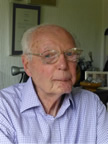We saw an example recently of what can happen if a politician does a speech ‘the old fashioned way’, ie, from memory and not using the magic of the autocue. Ed Milliband literally forgot two key important elements of his party address and he was lambasted for it. That answers the question, ‘What would we do without the autocue?’, but what about ‘How did the autocue come about?’…. So I went to meet Sheppertonian Ben Palmer.
The reason Ben could help is because he suggested the idea to the BBC back in the 1950’s. Ben is nearly 91 and still as sharp as a tack. As a child he had watched his father tinker with and build wireless sets. Ben himself tried his hand and was soon producing and selling crystal sets to his school mates for a shilling a piece. But it was before the war, when a friend took him to an exhibition and he first set eyes on a TV and TV cameras that he felt his calling in life. He was called up during WW2 and spent time in the RAF where he learned new skills in radio and radar.
This was to stand him in good stead and he went on to gain qualifications which ultimately got him into his first job at the BBC, initially in radio and then TV in the early days. What a start to a career. It is often the ‘bright young things’ that come up with new and fresh ideas. Ben Palmer had a knack for finding ways of improving things.
So when he was on the team of Sportsview, the BBC’s new sport programme, they were faced with the challenge of cueing film inserts into the programme. These days everything is digital, but back then it was on a Telecine machine which took several seconds to run up to speed. This meant that there may be a 10 second gap before viewers saw it.
The Producer tried cue cards so the presenter could make the transition between his ad-libbing and the introduction of the clip, but inevitably the positioning of the cards meant the presenter looked as if he was reading something off screen and not addressing the viewer, which was not at all satisfactory.
Ben stepped in “I suggested we might arrange a sheet of glass at 45 degrees over the camera lens which could reflect a image of the script” writes Ben in his autobiography “In this way the speaker would look directly at the lens and hence the viewer, but still be able to read the words”. Initially this was greeted with some scepticism from the old guard at the Beeb who felt this was conning the viewer. The Producer had no such scruples and immediately used the device.
As we know, the technique has been developed over the years and is now an accepted element of TV and major addresses. We do not realise there is any promt system there and believe the speaker is just talking to us without notes. Needless to say Ben didn’t benefit financially from the invention, but he has the honour of knowing what a key role he played in its introduction. Ben Palmers pioneering spirit was not just in evidence in his career.
One summer holiday he joined friends on a sailing jaunt to Jersey. What Ben had not realised when he accepted the invitation was that it was in a 16ft open day boat with one sail and a jib made from a bed sheet! The pioneering spirit ended up with a narrow escape due to thick fog and a leaking boat. They got mentioned in the Guernsey newspaper.! But maybe that is a tale for another time….

